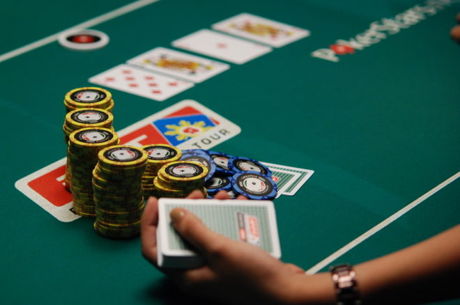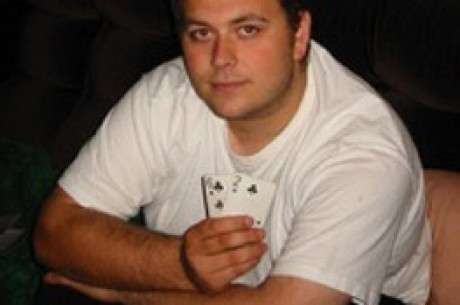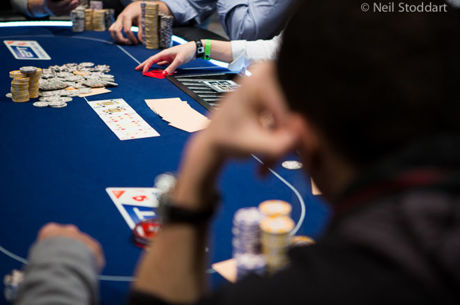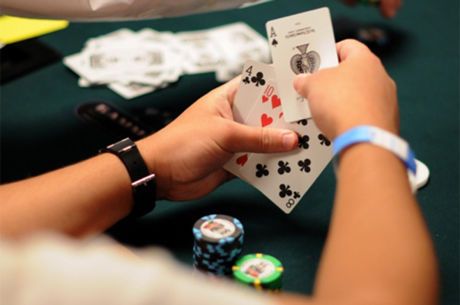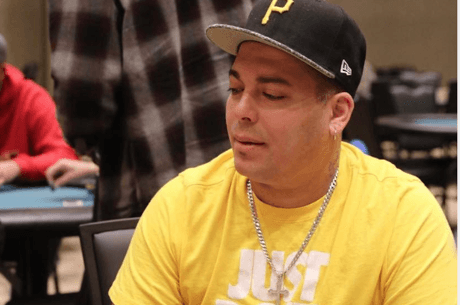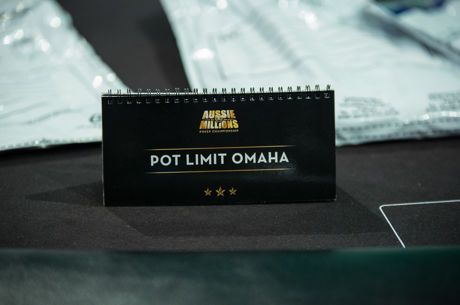Introduction to Omaha, Part two: Keep it low; Keep it tight
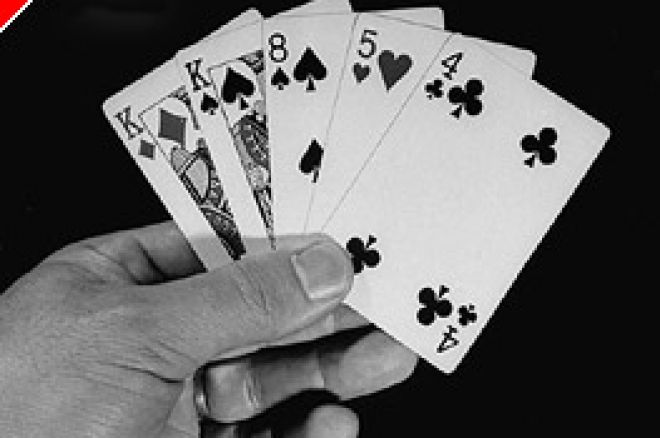
Introduction
Welcome to my second article for on-line players new to the poker game of Omaha. If you read my first article in this series, you will know a bit about me already, but I will briefly recap for new readers. I am based in England and play most forms of on-line poker on a regular basis. Like so many of you, I try to fit this activity around a busy family life. My aim in writing these columns is to reflect the experience of this reality and offer some useful ideas for profitable play. I am not a top professional dispensing crumbs of comfort for you to pick up nor do I pretend to be, but I do make a profit overall.
Last time, I examined one of the fundamental building blocks of Omaha, the question of how many cards you should be using from your four hole cards and how many from the five community cards. Too many people open an on-line account fresh from watching the final stages of a high stakes Texas Hold'em game on TV, then stumble across Omaha only to apply the wrong rules to that game! It is acutely embarrassing, not to mention expensive, to bet your full house strongly only to lose to three of a kind.
High or Split?
You may also have noticed that there are two variations of Omaha on offer. There is Omaha (also known as Omaha High) where only one high hand can win, as in Texas Hold'em. Then there is Omaha Hi/Lo (also known as Omaha Split, or sometimes Omaha Eights or Better) where two pots are up for grabs, one a high hand and one a low hand. The differences between the two variants are major and I will look at these in the next article.
This current article is written for Omaha High and all references to "Omaha" refer to that variation. However, the basic principles mentioned apply to both variations.
Keep it low
By now, you may have played some hands of low-stakes limit Omaha and got your mind used to the idea of using just the two cards from the hole and three cards from the board. Hopefully, you will not have had a fit of bravado following a profitable session and moved briskly up the limits or, heaven forbid, entered a pot limit table! If you have, maybe you have also refilled your account with further funds from your bank. This is nature's way of dealing with over-confidence in poker.
While learning the game, keep playing those low limit stakes. If you started off with a bankroll of $200 or $300, stick to the $1/$2 limit tables or perhaps even smaller limits which some poker rooms offer. The reason is this: At the $1/$2 limit table, your opening bet is $1 before the flop, $1 after the flop, $2 after the turn card and $2 after the river card. On top of that, you might be asked to call a raise or you might raise the betting yourself. Whatever the case, if you bet through to the end of the betting rounds, you still spend a minimum of $6. Unless you win a few of these hands, your $200 or $300 will not last for very long.
Keep it tight
You must play tightly and only bet quality cards which improve as the cards appear on the flop and beyond. Don't go chasing after cards where the chances of them appearing are low, especially if another player is showing strength by raising. I will go into more detail about the choice of playing or folding your cards during the betting in later articles.
The key to consistent performance lies before the flop. You must only play those cards which give you a sporting chance of having the best hand of all those around you. All those players have four cards in the hole, not just you. Consequently, you really want to have all four hole cards working for you even though you can only use two.
This is Omaha, not Hold'em
If you are dealt Ad Ks 8c 4h, you must not play with a reflex action conditioned by your Texas Hold'em experience which tells you that AK in the hole is strong. Sure, AK can be used by you in Omaha but you are likely to be way behind already. With four hole cards, there are SIX combinations of two cards. A very good Omaha hand has SIX two-card possibilities that might themselves be playable in Hold'em. It doesn't happen too often that you get all six but I would suggest you want at least four.
In the example I have given, Ad Ks 8c 4h, how many of these two-card combinations are typically playable in Texas Hold'em if you adopt a sensible, tight attitude, as a new player should?
Ad Ks Playable from any position relative to the dealer (the Button).
Ad 8c Weak but playable from late position (you are last to act in the betting)
Ad 4h Weak but playable from late position (you are last to act in the betting)
Ks 8c Fold
Ks 4h Fold
8c 4h Fold
Only AK above is a strong Hold'em hand. Many tight players would fold all the other five.
Texas Hold'em and Omaha are different species of game. AK is a strong hand in Texas Hold'em, yet AK84, AKT3, AK75 and similar hands where the AK is isolated and the ace is not suited with another card is generally a bad hand in Omaha.
You may still ask why. Well, AK in Hold'em will, about 50% of the time, give the holder a pair of aces or kings with the top kicker. That is often a winning hand. In Omaha, a single pair of aces or kings is hopeless most of the time.
What's good in Omaha?
In Omaha, you are looking for straights and flushes and full houses. These win the most times, often outdrawing another one. Even straights are vulnerable if there are three of the same suit on the board or there is a pair on the board. A pair often supplies someone with a full house. Consequently, AAKQ with both aces suited (eg, Ad Kd Ac Qc) is very strong because all six combinations offer strong possibilities of the nuts. It is not only the high cards that are strong but the key is the connections between the cards. Similarly, Jc Td 9c 8d is strong because there is a large number of straight draws and flush draws as back up too.
A wide choice
In Omaha, you want as many strong possibilities as you can to make a solid hand with the help of the flop. The above example, Ad Ks 8c 4h, doesn't do that for you because there are:
- no possibilities of flushes (you need two of the same suit in the hole ideally with one high card, preferably the ace for nut flush);
- only two possibilities of a straight (you need three consecutive cards to come down on the board out of five cards; 567 or QJT) and only one could be the nuts;
- no obvious full house potential (the stronger hands tend to make the full house with a pair in the hole rather than using one card to match a pair on the board and one card to make the other part).
Hands weaker than a straight rarely win at a full table of Omaha so if your hole cards do not lend themselves to a combination of several hands from the quality list of straights, flushes or full houses you are walking on shaky ground before you have made a bet. Think of it this way; would you put a coin in a slot machine with four reels knowing that at least one reel doesn't contain a "BAR" or "7" to make the big payout lines? You need all four working for you to maximise your chances of scooping the winning line. When you are odds-against before the flop, why waste your money?
Conclusion
There are lots of subtleties in the game of Omaha and only through the experience of playing can you learn them. However, one thing you need to know straight off the top is how not to waste your money. Omaha is a game of many cards and potential hands. Most of your opponents will want to see all five cards on the board before deciding they cannot win a hand. That is very expensive but it feeds the pot. In turn, this keeps people in the hand hoping to scoop on the river.
You want to grab those pots as cheaply as possible. You can only do that by selecting your starting hands carefully before paying your money. Play only with quality starting hands. They will take care of themselves over time as will your profits.
Until it is second nature to you, stay low and tight!
Exorcism
14 April 2005
Please visit our online poker room directory to see the best bonuses on the web!

